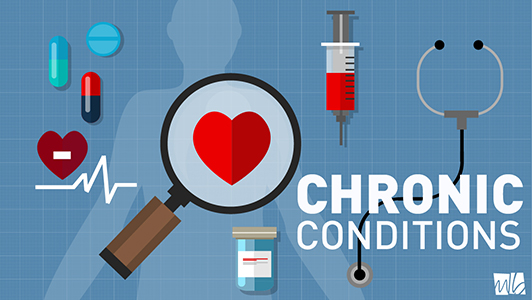Healthy Lifestyle Changes for Chronic Disease Management

Individuals who have chronic diseases such as diabetes, heart disease as well as arthritis deal with some of the complex health and life issues. With effective management, individuals can lead fulfilling lives while mitigating the effects of these conditions. At FirstPointMD, our team, led by Dr. Patel, is devoted to the fact that living a healthy life is the first and the most significant step towards managing chronic disease. This is a complete article that talks in detail about the key lifestyle changes that can be implemented to assist in the management of chronic conditions.
Understanding Chronic Diseases
Chronic illnesses are situations that last for a long time and often need ongoing medical attention and which may also limit everyday human activities. As stated by the World Health Organization (WHO), diseases that cannot be cured and are located in the east world make up approximately 71% of the total deaths in the whole world. One way to account for such a heavy burden is to admit that social well-being is not just about physical health but rather mental and emotional health as well. Hence a multifaceted approach that includes medical treatment alongside lifestyle changes is pivotal to recovery.
1. Balanced Diet: The Cornerstone of Chronic Disease Management
Nutrition is an important part of the treatment of chronic diseases. A balanced diet is one way to get the symptoms in control and stay clear from troubles. These are the suggested alterations in diet:
- Prioritize Whole Foods: Whole grains, fruits, vegetables, lean proteins, and healthy fats should be the dominant part of your diet. These nutrients are the basic components of our essential vitamins and minerals, they promote metabolic health in the body, and fight off inflammation.
- Limit Processed Foods: Most processed foods contain sugars, salt, and unhealthy fats that can make chronic diseases get even worse. Cutting out potato chips, fast food, and sugary drinks would be some examples of such a change in your diet.
- Control Portion Sizes: Eating mindfully and selecting the right portion sizes could be a smart method for losing weight to handle some typical diseases that usually accompany the increasing body mass index.|
- Stay Hydrated: Drinking water is essential for the human body. Water also helps in processes such as digestion, absorption of nutrients, and removal of toxins from the body. Try to drink around 8 cups of water each day, increasing your water consumption according to your activities and the climate.
2. Regular Physical Activity: Moving Towards Wellness
Physical activity is a great way to manage a variety of chronic diseases. It helps improve the heart’s condition, develop muscles, and generate better emotional conditions. Doing exercises whether as a part of a routine or as leisure can be done, of the following ways:
- Consult with a Healthcare Provider: You should never delay before you get started on a new exercise program. You should first get counsel from your doctors to tell activities that are tailored for your specific needs and limitations.
- Find Activities You Enjoy: Whether it is walking, swimming, dancing, or yoga engaging in activities you like increase the probability of you sticking with your routine.
- Set Realistic Goals: It is advisable to start with achievable targets, for example, 10-15 minutes of activity a day, and gradually build on those as you grow in stamina and strength. Moreover, you should do at least 2 and a half hours of vitality filled action for the week.
- Incorporate Strength Training: Building muscle and speed up metabolism through adding resitance-channels in your regular workouts. Make muscle-strengthening activities a part of your routine for at least two days a week.
3. Stress Management: Finding Balance
Health is greatly influenced by balance and it gets out of balance due to chronic stress, causing both physical and mental conditions to surface along with the other issues that need to be addressed. Thus, raising awareness of the existence of stress management interventions is crucial. Check out the following:
- Mindfulness and Meditation: The use of like meditation and deep breathing technique is such as mindfulness that helps calm the mind, and increase one’s ability to cope with difficulty.
- Engage in Hobbies: It is a must to join in the hobbies that you can find thrilling. The pursuit of hobbies or activities that give joy can be a major instrument in relieving stress and improving happiness whether it is painting, gardening, or reading.
- Stay Socially Active: Obeying the social distancing rules is a requirement for emotional-depression risk some. Engage with your friends and family or meet up with new people who also have been through similar experiences and unlocked feelings.
- Consider Professional Help: If stress starts to overtake everything, a mental health expert guides individuals in the most effective way to cope with challenges.
4. Sleep Hygiene: Prioritizing Rest
The best way of managing chronic diseases is through proper sleep. Bad sleep brings about the increase of certain hormones, stimulation of the immune system, and the occurrence of inflammation, thus the worsening of health conditions. Follow these guidelines carefully if you want to improve your sleep:
- Establish a Sleep Routine: It is imperative to choose specific times to go to sleep and wake up. Being consistent in this sleep routine no matter if it is a weekend or a week is the main factor in the regulation of your body’s internal clock.
- Create a Restful Environment: Make your bedroom a good atmosphere to sleep by keeping it cool, dark, and silent. Probably earplugs or an eye mask will be of help for you. Especially when there is noise or light outside.
- Limit Screen Time: Reducing exposure to screens at night when going to sleep is, by the way, a good idea, because the blue light can delay melatonin sleep hormone hat makes fell asleep(…30% less production thus delayed father 30 it means it will take 10 minutes more of your time
- Avoid Stimulants: Cut down your caffeine and nicotine intake during the hours before bedtime at night, thus, you could have a better quality sleep and drift into peaceful slumber.
5. Regular Health Check-ups: Staying Proactive
Consistent medical check-ups are vital for the proper functioning of many chronic diseases. The health of many Doctor’s offices, including Dr. Patel at the FirstPointMD, is staffed with paramedics who are pro-health.
- Stay Up-to-Date with Screenings: General examinations and screenings may provide most women with a fair chance of detection of a possible disease earlier on. Use only the necessary tests as prescribed by your doctor.
- Maintain Open Communication: Find a support system, the best move to get through it. Seek advice from the right people about changes in symptoms, medications, or lifestyle. Express your worries ahead of time especially the ones involving your health.
- Educate Yourself: One way to succeed in calmly managing a health problem is to have up-to-date and complete health info. Aware of your state, in its turn, empowers you to make the right decisions thwarting the help of doctors to cure you.
6. Building a Support Network: You’re Not Alone
Patients who are suffering from chronic illnesses feel overwhelmed with these hardships. Yet, depending on the family or friends that have developed a strong relationship with you can change the situation significantly. We will cover the following steps in this section:
- Connect with Family and Friends: Discuss your goals and hardships with loved ones so they can offer support and responsibility.
- Seek Support Groups: Undertake to pass below some helping hands inviting friends to join in the tasks can increase motivation. Around the same token, accept encouragement in the form of challenging you to instructors or pals.
- Work with Healthcare Professionals: Nutritionists, physical therapists, and mental health professionals can be another source of customized support in their team. Drawing up a total strategy will help provide more thorough care than is likely.
Conclusion
To effectively prevent and manage chronic diseases requires an approach that includes a healthy lifestyle and strong social supports alongside regular medical care. Dr. Patel and the rest of the team are not the kind of people who pay attention to their patients’ illnesses only. They make sure that they treat the patient as a whole person through a very effective program in which they also follow up on proper nutrition and meal plans, exercise sessions, stress reduction techniques, and regular physical medical check-ups. It is important to remember that small things can result in significant effects, and this must change gradually over time with a healthier and happier life being the ultimate goal.
Adopt these lifestyle modifications, and become the able manager of your health today!







